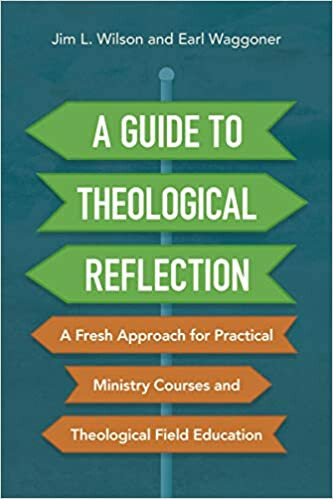
TFE Student Resources

A Guide to Theological Reflection by Wilson & Waggoner is a required text in all TFE sections.
Theological Field Education (TFE) at Gateway Seminary depends upon volunteer field mentors who supervise students during their ministry practicum. We are gratefully indebted to these men and women, who give at least one hour each week to meet with students during their practicum. If you are a current field mentor or desire to become one, the information found on this page will be helpful.
General Qualifications of a Field Mentor:
- Attend or view the one-hour TFE Field Mentor Briefing (web conference) prior to the TFE course.
- Service in a full-time ministry position for at least three years
- Service in their current ministry for at least one year
- Formal theological training and/or several years of significant ministry experience
- Practices the ministry skills needed by the student
- Commits to the student’s learning process and teaching new ministry skills
- Commits to the student’s professional and personal growth
- Commits to being a “safe” person with whom the student can share openly and honestly
- Is able to handle the doubts, fears, failures, and insecurities of a student minister
- Commits to meeting one-on-one with the student for at least one hour per week during the two-semesters
- Understands the difference between a one-on-one meeting and a staff meeting
- Commits to submitting monthly reports required by the syllabus due dates
- Commits to participating in the midterm 2700 Evaluation Conference
- Commits to participating in the 3600 Evaluation Conference in the spring
Field Mentors may not be:
- A relative of the student
- Another Gateway Seminary student (exceptions, DMin, ThM and PhD students)
- A member of the student’s Ministry Reflection Group
- The same person as the student’s Spiritual Formation Mentor
The Director of TFE or the Regional Campus TFE Coordinator may consider making exceptions as needed.
Field Mentor Files and Forms:
Theological Field Education (TFE) at Gateway Seminary depends upon volunteer Spiritual Formation Mentors who mentor students in the area of spiritual formation during their ministry practicum. We are gratefully indebted to these men and women, who give at least one hour each month to meet with students during their practicum. If you are a current Spiritual Mentor or desire to become one, the information on this page will be helpful.
General qualifications for Spiritual Formation Mentors:
-
- Demonstrates spiritual growth and has a deep level of spiritual maturity.
- Models transparency for open and honest discussion in areas of spirituality and personhood.
- Maintains confidences.
- Demonstrates spiritual and personal integrity.
- Gives time and attention in meeting at least once a month for a minimum of an hour during the student’s ministry practicum. The student and Mentor may meet longer or more often.
- Challenges the student to go to higher levels in their spiritual journey.
- Commits to submitting monthly reports required by the syllabus due dates.
- Commits to participating in the midterm 2700
A Spiritual Formation Mentor may not be:
- A relative of the student
- Another Gateway Seminary student (exceptions, DMin, ThM and PhD students)
- A member of the student's Ministry Reflection Group
- The student's Field Mentor
Spiritual Formation Mentor Files and Forms:
Theological Field Education (TFE) at Gateway Seminary depends upon volunteer ministry reflection groups (MRG) that provides feedback on ministry skills and performance as well as issues of character and personhood to our students. The MRG is a team created in a ministry setting by the student to work with him/her during the ministry practicum. The persons receiving or observing the ministry are significant persons from whom the minister can get feedback. We are gratefully indebted to these men and women, who meet with a student at least three times during each semester of TFE.
Guidelines for choosing members to serve on the MRG:
-
- The student will enlist four to five members, schedule all monthly MRG meetings, and provide MRG training for the group.
- The student should not enlist admirers and/or supporters. Likewise, students should not enlist their greatest critic to win them over. Instead, enlist persons that will give direct honest feedback.
- Members should represent as many adult age groups within the ministry setting as possible.
- Members should be ministry recipients (those the student leads or teaches) and/or ministry partners (those the student ministers alongside). It is preferred that ministry partners not be persons on the church staff.
- The MRG should include at least one male and one female for perspective, if possible.
- The MRG should include at least one person that serves as a leader in a ministry setting.
- If available, one member should be a supervisor in their vocation.
- The student will enlist one member to be the MRG Representative.
- The MRG Representative commits to summarizing the group discussion and will submit five bi-monthly reports required by the syllabus due dates.
- The MRG Representative commits to participating in the midterm 2700
- The MRG Representative commits to participating in the on campus 3600 Evaluation Conference in the spring.
The MRG members may not include:
- Members of the student's family (including extended family)
- Gateway Seminary professors
- Other Gateway Seminary students (exceptions, DMin, ThM and PhD students)
Responsibilities of the MRG:
-
- Students will meet with their MRG for one hour bi-monthly during the two-semester schedule (Aug-Sep, Oct-Nov, Feb-Mar). The MRG Representative will meet and represent the MRG in the 2700 meeting in Dec-Jan without the student and in the 3600 evaluation in Apr-May with the student.
- The MRG session MUST have at least three members present or the meeting must be rescheduled. Less than three MRG members present – NO MEETING.
- Student bear the responsibility for each action and decision made, even if that action or decision results from discussion with the MRG.
- Give the MRG permission to give you constructive criticism.
- Each MRG meeting will provide approximately ten minutes with the student out of the room, which allows the group to discuss the student and ministry in private.
- The student and the MRG must be sensitive and careful about confidences. The student should not present any material to the MRG that would violate a confidence. The MRG should demonstrate maturity and not discuss the consultation session and agenda outside the MRG meetings. All proceedings (information, discussion, comments, and completed evaluation forms) of the Ministry Reflection Group are to remain confidential.

